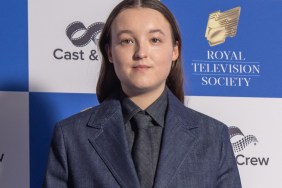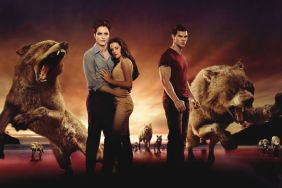A couple weeks back, the Coen Brothers, Joel and Ethan, returned to the Toronto Film Festival with A Serious Man, their third movie in three years. This time, they’re exploring their own Jewish roots in suburban Minnesota during the late ’60s with the fable-like tale of physics professor Larry Gopnik (Michael Stuhlbarg) who finds out that his wife Judity (Sari Lennick) wants a ritual divorce, just as the rest of his life is starting to fall apart. At the same time, Larry’s unemployable brother Arthur (Richard Kind) has moved in with the family–and ends up sharing a hotel room with Larry when he’s forced out of his own home–and his kids are dealing with their own issues. The question is whether the enigmatic guidance Larry receives from his local Rabbis can possibly help and whether things will eventually work themselves out like they say.
ComingSoon.net attended a roundtable interview with a group of other journalists while up in Toronto for the festival and here’s what the Coen Brothers had to say about their most personal and autobiographical work to date.
ComingSoon.net: Barton Fink was a character who had some battles with his heritage. Those themes, how did you want to revisit them here and expand on them? Was that a conscious decision?
Ethan Coen: Well, we weren’t thinking about “Barton Fink” really specifically at all, either as a point of contrast or similarity. It’s also a Jewish character, but that didn’t particularly recall like Barton Fink to us. No, I must say that is kind of a different thing for us.
CS: Is it true that this was influenced by your father?
Joel Coen: No, it’s semi-autobiographical I guess you can say, in the sense that the context of the story takes place in a community very much like the one that we grew up in, Minnesota 1967, and also therein are a couple very superficial similarities to our family. Actually, really the only one is that the father is an academic, and our father was a university professor, but beyond that, he wasn’t really anything like the character in the movie and the story is made up and doesn’t really have anything to do with anything that happened in our family.
CS: You were not fans of “F-Troop”?
Joel: Actually, that’s the other… we were big “F-Troop” fans. (laughter)
CS: You mentioned the incongruity of Jews on the Plains compared to New York and L.A. Can you elaborate on that?
Ethan: It’s true. Another thing that seems incongruous to us about it is the whole weird geographic landscape, the nature of the landscape with Jews on it is funny. Maybe that’s why we put the whole beginning story in there to frame it. The whole shtetl thing, you got Jews and Shtetls and then you look at the prairie and Minnesota, and you think or we kind of think–and I don’t know why with some perspective on it and having moved out–you kind of think, “What are we doing there?” It just seems odd.
Joel: Mel Brooks once wrote a song called “Jews in Outer Space” and I guess that’s sort of the idea.
CS: Did this movie come from you feeling that you’ve had this commercial run of movies, and we want to do something intensely personal and offbeat and perhaps non-commercial?
Ethan: Being non-commercial is never an ambition. (laughter) No, movies come together at different points for fortuitous reasons, rarely through any kind of design, like “I’m going to follow this one with that one.” It’s more like when you can get the money or not in the case of this movie, schedule the actors, because this wasn’t the case of having to juggle movie stars’ schedules. But for whatever reasons, you do them as you get the opportunity, as opposed to doing them when you choose to or design to.

CS: You mentioned the commercial aspects of the movie, but did you think about how a movie like this might be perceived by Jews vs. non-Jews?
Joel: That’s actually something we’re very curious about, and I think we were curious about it as soon as we started making the movie. It’s about to be seen, but we are curious how a lot of it translates to a broader audience, I mean, outside of its obvious constituency, but it’s pretty encouraging I have to say.
Ethan: Yeah, I must say, we’re probably both… not even worried, but curious about whether there would be hostility but religious Jews who’ve seen it so far have been surprisingly open to it. I guess one’s concern is that a lot of Jews see things through the prism of “Is this good for the Jews?” (laughter) I must say…
Joel: Yeah, we haven’t encountered any negative pushback. In fact, it’s been just the opposite, which is very gratifying because obviously, the spirit in which it was made was as sort of an affectionate representation of something we were very familiar with. We’ll see, because it hasn’t really been out there.
CS: Did you ever feel any of the anti-Semitism growing up in Minnesota as we sometimes see in this movie?
Joel: No.
Ethan: No. There was actually a large Jewish community
but that’s a common… I mean, we aren’t, but I assume all Jews are fascinated by anti-Semitism. I don’t know why.
CS: Why did you decide not to have any big stars in this, when you’re at the point where you can probably get any actor you want in a Coens Brothers film?
Joel: Who suggests themselves as a big bankable star as a Midwestern Jew? At least one that would pass our smell test?
CS: There’s a hint in this movie that characters in at least your last two movies might be in the same world. Have you been secretly sneaking things into your movies to show that all of your movies happen in the same world?
Ethan: Yeah, it’s part of a grand Balzacian tapestry. No, “Tuckman & Marsh” is just a good name for a law firm, and why be uptight just because you used it before?
CS: This is your third movie three years in a row that is playing at the Toronto Film Festival. The fact that you’re writing your own material and there’s a separate process for shooting and editing from that. How do you guys get around having to finish up one movie before starting the next one? Do you have a lot of overlap?
Ethan: Actually, you’re right, but in the case of–and this is a large part of the reason we’ve been here three years in a row–we wrote those three scripts pretty much together before started production on the first of the three which is “No Country for Old Men,” so we had a couple scripts in the bank, as it were.
CS: So do you have anything written that you can start shooting now that you’re done with this?
Joel: We have a script that we’ve written, but it’s probably not going to get… like last year we went directly from this film festival to our first day of shooting on this movie, and we have a script that we’ve written–the “True Grit” script–that hopefully
but we don’t know yet because it may or may not get done, but hopefully we’ll get that done in the spring.

CS: Because this was the movie closest to your own lives, was it harder to create the look because you were being more careful to get things right?
Joel: No, I think maybe a little easier because we had so much personal knowledge of the details that we were familiar with that we wanted to put in. It might have been the opposite.
Ethan: It was kind of fun in that respect. Jess Gonchor, the designer, is also suburban Jewish, although he’s East Coast and a little younger than us, but I think we all kind of enjoyed that aspect of it, the whole design thing. The set decorator was great even though she’s a shiksa. (laughter)
CS: Are you still writing “The Yiddish Policeman’s Union” and has this movie acted almost a primer for it?
Joel: We’re writing it, but not really. We actually had written this and finished the script and actually had a deal to make it before we were even offered “The Yiddish Policeman’s Union” so that wasn’t known to us at the point where we wrote this script.
CS: Are you going to write that in English?
Joel: I don’t know that we’re going to… I mean, we’re writing the script and we always approach these things incrementally when we’re given things to adapt. We write the scripts and then sometimes we do the movies and sometimes we don’t, but we’ll see. It’s sort of a complicated process. At this point, we’re not even finished with the script so we don’t know.
CS: You’ll be appearing in Minneapolis as part of a 25th Anniversary retrospective of your careers. Is it hard to look back over your careers like that?
Joel: I’m sorry that you asked that question. It’s not something… we don’t engage in a lot of reflection about our 25 years of making movies, and ordinarily don’t like to do those kinds of things. We actually feel like we’re doing it for The Walker because it’s a hometown thing and we get an unbelievable amount of support from the community in Minneapolis when we were making the movie, but it’s not something… but we’re doing it this time.
CS: Is it easier after 25 years to make movies where you really know what you want and what the movie is going to be?
Joel: It feels the same except in the respect that recently–I mean, over the past eight or ten years or maybe less–because we’ve been working with the same people for so long, it seems like we have a very efficient production machine, which I know didn’t feel quite that way when we were starting up. And after we started out, it didn’t feel as efficient as it is now.
Ethan: That’s true. Production doesn’t feel as daunting, but it’s a weird thing just figuring out… it’s still as hard to get your mind around attacking the problem of how you’re going to do stuff in some basic way.
Joel: Yeah, you always have to… that’s true. What hasn’t changed is the notion that every story has its own problems. They’re all related to this one strange process about how you get it done and recreate it for a film.
Ethan: Right, I mean you go looking at locations and you’ve thought to some degree about the spaces the scenes are going to take place in and the process is still the same. It’s still a little weird and a little stymying sometimes, you go into a place and you go, “Oh, okay, how would you do this? How would this work?” It’s still a strange amorphous problem every time.
Joel: It’s a puzzle, yeah.
CS: Can you guys comment on how “The Big Lebowski” has caught on, with some even adapting “Dude-ism” as a philosophy or way of life?
Joel: Nobody’s more surprised than we are.
A Serious Man opens in select cities on October 2. Look for our exclusive interview with actors Michael Stuhlbarg and Richard Kind coming soon!









